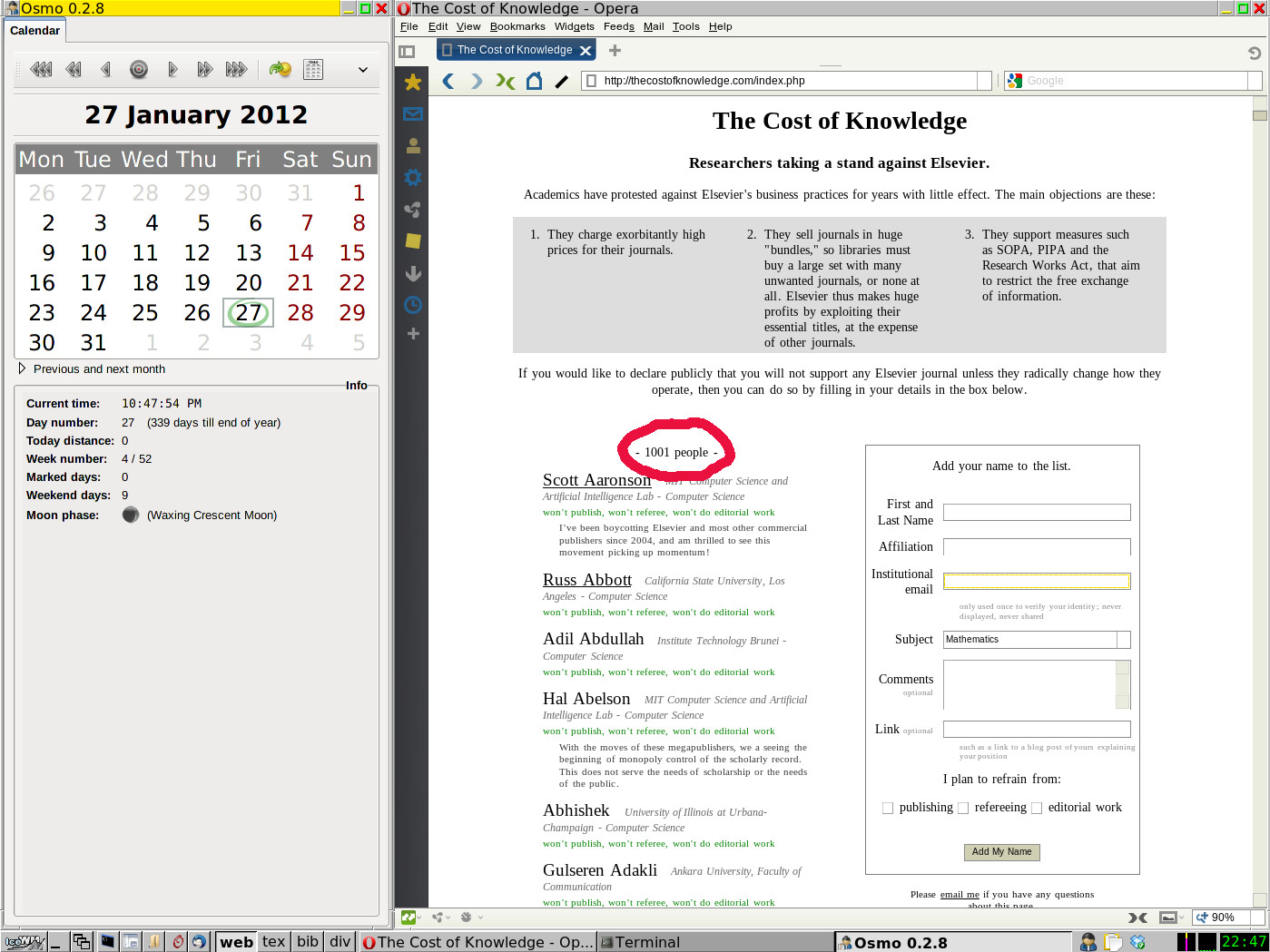I will no longer do referee work for journals that don't apply a true open access policy
April 2016
In brief
Publicly funded mathematicians submit ready-to-print articles to journals, the papers are peer-reviewed for free by publicly funded colleagues, and then the journals are sold to publicly funded libraries... Who gets the money?
I only became gradually aware of the absurdity of this system. At first I had only in mind a distinction between private publishers (Springer, Elsevier...) vs academic publishers (very vague notion), as reflected in my 2012 «Sergio Leone post» that I reproduce below, just for fun.
I finally came to realize that the relevant distinction is between open-access or not. And then again, we have to be careful with words, so let me give you the only definition of open-access that will be considered here.
Minimal definition of a true open access policy
- The articles are available online free of charge for all readers.
- No fee is required to authors or their institutions in order to publish their work under an open access policy.
The A-list ("diamond")
Examples of journals that apply a true open access policy (the following lists are by no mean complete, even in my fields of interest: algebraic geometry, group theory and geometric topology).
- Acta Mathematica (since 2017)
- Algebraic Geometry (Foundation Compositio Mathematica)
- Annales de la Faculté des Sciences de Toulouse
- Annales Henri Lebesgue
- Annales de l'Institut Fourier
- Annales Mathématiques Blaise Pascal
- Confluentes Mathematici
- Épijournal de Géométrie Algébrique
- Journal de l'Ecole Polytechnique - Mathématiques
- New York Journal of Mathematics
- North-Western European Journal of Mathematics
- Osaka Journal of Math (via projecteuclid.org)
- Publicacions Matemàtiques
- Revista de la Unión Matemática Argentina
The B-list
Others journals that apply a similar policy, except for recent articles (1 to 5 years), and whose subscription seems to be at a fair price (I will also accept to act as a referee for such journals):
- Annales scientifiques de l'École normale supérieure (5 years, via numdam.org)
- Annals of Mathematics (5 years)
- Bulletin de la SMF (5 years, via numdam.org)
- Canadian Journal of Mathematics (5 years)
- Geometry & Topology (5 years)
- Journal of the American Mathematical Society (5 years)
- Journal of Differential Geometry (5 years, via projecteuclid.org)
- Journal of the European Mathematical Society (5 years)
- Journal of Mathematical Sciences, The University of Tokyo (1 year)
- Journal of the Math. Soc. of Japan (3 years, via projecteuclid.org)
- Mathematica Scandinavica (5 years)
- Moscow Mathematical Journal (5 years)
- Proceedings of the American Math. Soc. (5 years)
- Transactions of the American Math. Soc. (5 years)
A few links
CIMPA list of Mathematical Journals that apply a Diamond Open Access policy
Scientific Publishing: A Mathematician's Viewpoint, by Joan S. Birman
Similar statement by two Ecologists
A recent answer on stackexchange by B. Klockner
the PolyMath journal publishing reform page (2012).
Roads to Open Access: The Good, the Bad and the Ugly, by Karim Ramdani
Archives: The Good, the Bad and the Ugly among Mathematical Journals
(Posted on January 2012)
Here follows a list of (almost?) all math journals where I acted as author or referee. You will notice a slight bias towards academic journals... In my early years I was not aware of these subtle distinctions (I published the results of my phD as notes to the CRAS and a paper in the Journal of Algebra), but since then I carefully avoided the Dutch publisher Elsevier.
Academics have protested against Elsevier's business practices for
years with little effect. The main objections are :
(i) They charge exorbitantly high prices for their journals;
(ii) They sell journals in huge "bundles";
(iii) They support measures that aim to restrict the free exchange of information.
If you would like to declare publicly that you will not support any Elsevier journal unless they radically change how they operate, then you can do so by going on this website
... If you first want more information a good place to start might be this page by J. Baez. See also the PolyMath journal publishing reform page.
Screenshot from my computer
27th January 2012, 10:47pm Toulouse time, already One Thousand and One researchers taking a stand against Elsevier:



